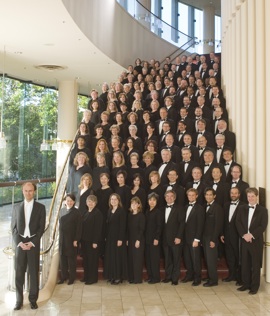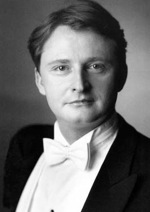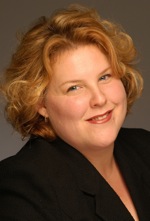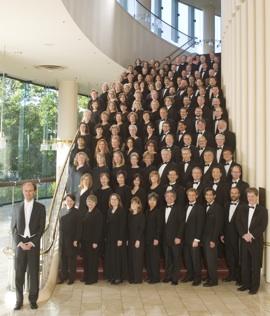
Instead of the nearly three-hour-long 1734 Weihnachtsoratorium, there was a 1¾-hour English-language version — still consisting of six oratorios chronicling the birth of Christ, but with some big changes.
Besides cutting the total running time almost in half, San Francisco Symphony Chorus Director Ragnar Bohlin introduced musical and textual bridges and transitions to maintain continuity. He succeeded admirably, presenting an expansive, memorable work.
Traditionalists should not be scandalized, as Bach himself played fast and loose with his own music, rearranging, reusing, and repeating various works. Christmas Oratorio itself is a digest of earlier ecclesiastic and secular pieces, each part originally intended for performance on one of the major feast days of the Christmas period.
Ultimately, the proof of the pudding is in the performance. Here, Bohlin ruled over a reduced orchestra (two dozen players) and Symphony Chorus (44 singers) with an iron hand in velvet gloves. A more pleasant gentleman on the podium you will never see, but Bohlin gets his way just as well as if he were channeling Toscanini in a bad mood.
The balance was excellent, even though the chorus was seated behind the orchestra on stage, not in its usual perch in the Center Terrace, where it can be seen and therefore heard better. The men’s sections and the altos were outstanding; the sopranos were OK, but without any special sheen in the voices most of the time.
High points of the Bohlin–Chorus collaboration were the quiet, more lyrical or devotional pieces, such as “How can I fitly greet Thee” and “Thy splendor drives the night away,” along with the broad hymnal “Glory to God in the highest” and “Rejoice and sing!”

Tempos tended to slow down a bit, especially in the otherwise beautifully played Sinfonia. The perfect tempo — consistent, forward moving, not hasty — was taken up several times, perhaps most impressively in the introduction to Part 5 and the subsequent “Glory be to God.”
The elongated, gently rocking sounds of the introduction to Part 3, and “Ruler of heaven,” were exhilarating. Concertmaster Mark Volkert and principal cellist Peter Wyrick led string and keyboard obbligatos.
With tenor-great Set Svanholm as his grandfather and soprano Ingela Bohlin as his sister, Ragnar Bohlin has “sublimated” his operatic pedigree into choral music. At 44, he has done exceedingly well at that, and his vocal expertise received a brilliant demonstration in his choice of soloists, all making their local debuts, all of them terrific.
Two singers are fellow Swedes: soprano Malin Christensson and baritone Anders Larsson. The German tenor Lothar Odinius sang the Evangelist, while contralto Marie-Nicole Lemieux hails from Canada.
Christensson has a bright (almost overbright) voice and an attractive, “sincere” way of phrasing. “Say my Savior, tell me rightly,” with Chorus member Cindy Wyvill as the echo soprano, was an operatic high point. And, in opera, Christensson should be excellent as Susanna in Le nozze di Figaro, even more than the Papagena/Dew Fairy repertory with which she started her career. She has recorded Sophie (Werther) with Villazon and Garanča for Deutsche Grammophon. She also played Jenny Lind in the Hans Christian Andersen film biography, Once Upon a Time.

Look for Larsson in concert halls and opera houses. From “Mighty Lord of creation” to “Enlighten Thou my blinded senses,” Larsson held the audience in rapt attention. He is a major talent, with a big, warm, appealing voice and obvious versatility — roles as Germont, Onegin, Belcore, Mandryka, Escamillo, Papageno, Donner are already under his belt in various European houses. (I wish David Gockley had heard him Sunday, instead of being at a concert in next-door Herbst Theatre.)

Odinius is an ideal Evangelist, with precisely the right tone and clarity, though he is also well-suited to such roles as Pedrillo, Don Ottavio, and Tamino. Oratorios are likely to be his main career, so good he is in the genre. His arias, especially “Happy shepherds” (with obbligato by flutist Robin McKee), had a sweet sound, were simple, and seemed to come from the heart.
Lemieux is a force of nature, a mezzo/alto/contralto/call-her-what-you-wish, singing the most impressive “Sleep Thou my dearest” I have ever heard. Besides oratorio and lieder, she also sings opera — Orfeo, Giulio Cesare, Bradamante. Appropriately, she held back on what appears to be an unlimited power; hers is the kind of voice that can fill opera houses effortlessly.

